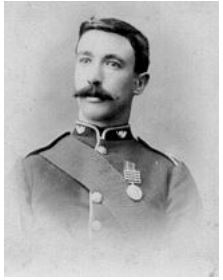‘C’ Company, 2nd Battalion, King’s Own Yorkshire Light Infantry

Job Millin (as he was known) was born at Ampney St Peter, near Cirencester on 28 April 1879. He was one of eight sons born to John Millin (who died when Job was eight) and his wife Louisa.
Job was a career soldier, who had joined the King’s Own Yorkshire Light Infantry (KOYLI) in 1899 and had served in the South African War, where he was mentioned in despatches.
When war broke out in August 1914 he was serving with the 2nd Battalion of the KOYLI and based in Dublin. The battalion was quickly re-deployed to France on 16 August and was part of 13th Brigade, 5 Division. Once in France it saw almost continuous action during the remainder of 1914. Job was now a Colour Serjeant and reportedly in August 1914, after an order to withdraw had been given, he ensured that an ammunition wagon was rescued and brought back to the British lines; an action for which he was awarded the Medal Militaire by the French Government. He suffered a head wound at this time, which necessitated treatment back in Britain and he did not return to France until 2 June 1915. Prior to this he had been commissioned into the 2nd KOYLI as a Second Lieutenant on 9 May.
In December 1915 the 2nd KOYLI transferred to 97 Brigade, 32 Division. As a Regular Army battalion its job was to ‘stiffen’ the fighting qualities of its companion battalions from the Highland Light Infantry, which were ‘New Army’
On 1 July 1916, 97 Brigade was detailed to capture the Leipzig Salient and then join up with other units and to advance on Mouquet Farm. Between the salient and farm lay the German stronghold of the Wundt Werk. Despite artillery fire being switched onto the stronghold the advancing troops found themselves pinned down by intense fire from the Wundt Werk and enfilade fire from Thiepval to the north and another German strongpoint, the Nordwerk to the south, which meant that reserves could not make progress forward. The Leipzig Salient had been captured but the gain meant little whilst Thiepval, Wundt Werk and Nordwerk remained in German hands.
Job Millin, now a Temporary Captain, was one of five officers and 69 other ranks killed that day: 32 Division lost 3,949 killed, wounded or missing. Job’s body was never recovered and he is named on the Thiepval Memorial to the Missing of the Somme. However, some researchers believe that he is the unknown officer of the KOYLI buried in nearby Blighty Valley Cemetery. He is also commemorated on a brass tablet inside Ampney St Peter Church.
Job had married in 1906 and left behind a widow and two children.
(Additional information, supplied by Patricia Davey, granddaughter: CSM Millin was the senior man left standing when all his commissioned officers were either, injured, killed or taken prisoner. The order to retreat was received but he and his men refused to accept it and carried on fighting. CSM Millin fell from loss of blood from a serious head wound and upon regaining consciousness asked Lance Corporal Holmes if he could ride. Holmes said yes and CSM Millin ordered him to drive the Ammunition Wagon back to the British lines, riding with him to ensure the ammunition wagon got through. In addition to the Medal Militaire he was Mentioned in Despatches. He was not expected to survive his serious head wound but made an astonishing full recovery and received a commission. It is believed that following his death he was buried at the time but the grave was lost.)
